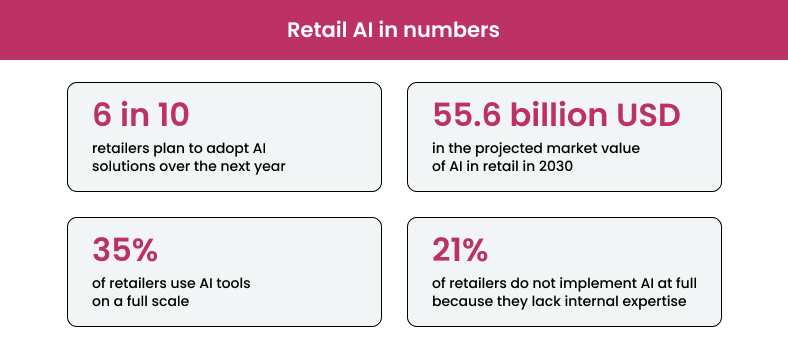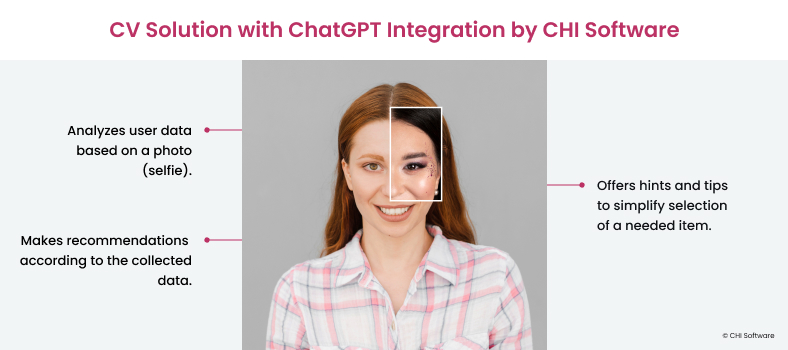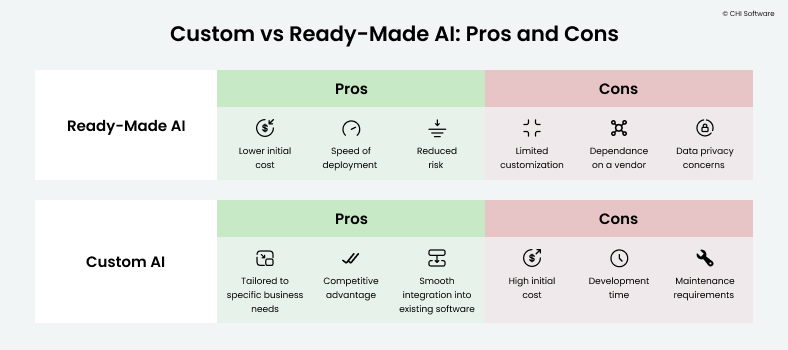The economy is stormy, and shoppers feel the consequences firsthand. To stay ahead, retailers must focus on efficiency. Artificial intelligence (AI) in the retail sector can become a silver bullet to help you succeed. Solid 48% of respondents believe AI technology will shape the domain in the next three to five years.
The adoption of artificial intelligence solutions is quickly becoming a hot trend, and if you avoid it, your market positions are at risk. Let us demonstrate use cases on how AI technology can step in to help you with the issues and process bottlenecks you face daily.
This article is a part of the “AI in retail” series, where we showcase all aspects of AI adoption for businesses. Other articles on this topic include:
The Retail AI Market Overview: How Technologies Change the Shopping Industry
Retail is quickly moving to digital, and digitalization, in turn, drives fast AI adoption. The report shows that the value of artificial intelligence in the retail market has skyrocketed to an estimated 7.1 billion USD in 2023, marking a 29% increase in AI investments from just a year earlier.
A fresh survey shows that respondents outlined three reasons for the increasing implementation of AI technology in retail businesses:
- enhance customer experience (59%);
- channel productivity (49%);
- achieving cost efficiencies and return on investment (44%).

The fundamental statistics concerning AI implementation in the retail industry
Sources: Honeywell, Fortune Business Insights
But is artificial intelligence a magic wand that can solve all business problems, or is it a short-lived hype? Let us delve into real-life use cases of retail AI research technology development to find out.
Why Does Your Retail Business Need AI Optimization?
The numbers look impressive, but how about details on the real business benefits of artificial intelligence in retail? We’re not going to make you believe in miracles – only in powerful AI algorithms.
1. Routine operations become more effective
Routine tasks go first because any retailer faces them daily:
- A supply chain is something many retailers have tried to optimize looking for the optimal route plans. AI algorithms make their suggestions on the best plan to use, eliminating the human factor.
- Picking and packing are now supplied by robotic power. Moreover, robots can collaborate and pack bigger orders together.
- The number of product returns can be reduced due to the early analysis of future purchase trends. Algorithms analyze previous transactions, searches, and even weather conditions.
2. The loyal audience is growing
Nowadays, AI can help retail provide smooth customer support in different scenarios: starting from automated checkouts and up to customer mood tracking. With technologies, you’ll be sure that every visitor has got enough attention and consultancy to make the final decision. It will eventually lead to higher customer satisfaction.
3. Personalized approach reaches the next level
Artificial intelligence allows transmitting online shopping to the offline environment. If a retailer has a website (which is more frequent now), AI algorithms will gather important customer statistics using email marketing and personal accounts. This information may then be used to predict customer behavior and make personalized offers to visitors through their loyalty cards.
4. The in-store space is used in an optimal way
Space and inventory optimization is an easy task for retailers using AI. Algorithms consider existing consumer preferences, product location, season and weather conditions, expiring dates, etc. to place shelves and products where visitors expect them to find intuitively. As a result, every store corner is well-thought-out, and sales are going up.
5. Data security efforts become more accurate
AI technology is the earliest to identify atypical data movements in the system, and no human administrator can do it faster. For this reason, lots of retailers use AI powers to provide solid data security. This measure is crucial as companies store a lot of information about their customers and buying trends.
Technologies Used for AI in the Retail Industry

In 2024, AI for retail has many variations, and we want to overview the specific technologies used by online and offline stores.
1. Automated checkouts
The core of this innovation is computer vision built in the store’s cameras and set up in several spots around the space. The system then recognizes the items picked up by the visitor as it’s connected with the stock database. When exiting the store, a customer can use an app’s account or a payment card to pay for groceries with a smartphone.
2. Robotics
Robots are a popular application of artificial intelligence in the retail industry. Just like virtual assistants at your house or in your smartphone, in-store robots use the ASR (Automatic Speech Recognition) technology that helps to identify the human’s speech and turn it into text. Robots can answer after processing the customer’s inquiry using predefined algorithms.
3. Personalized recommendations online
AI in online retail is more common than ever before. Have you ever thought about the power of YouTube or Netflix recommendations? These platforms have gained and retained their success mostly thanks to artificial intelligence.
It’s pretty much the same in retail. That’s how it may look like:
- Recommending items related to the one reviewed by the user;
- Giving hints at what other shoppers with similar preferences bought on the website;
- Offering products based on the customer’s previous purchases;
- Recommending the latest version of the reviewed item.
Before implementing something similar on your website, all gathered information should be verified. The product catalog should be complete, while each listing should contain quality annotations.
4. Virtual dressing rooms
Standing in the line to a dressing room, then trying every clothing piece on – not everyone likes this part of the shopping experience. In the pandemic reality, the issue is standing out even more sharply.
With virtual fitting rooms, people don’t have to leave their homes to find a perfect item or outfit. The AI technology places the item on the customer’s image to get a better understanding of the size, style, and color.
5. Mood tracking
Store workers can’t keep an eye on every visitor, but AI algorithms can. Your employees get a notification about an annoyed customer and can approach them immediately. This innovation boosts buyer satisfaction and expands your loyal audience quicker than traditional methods do.
6. Visual search
Visual search allows people to upload images of the item they are interested in and get products of similar colors and shapes. This is a great feature for big retailers with a wide range of offered items. This way, you meet the expectations of buyers who know exactly what they are looking for.
These technologies are only a few examples of existing AI solutions for retailers. The market is changing rapidly, responding to global trends and emerging customer needs.
AI for Retail in Real Life: Our Insights and Case Studies
The CHI team genuinely believes that AI can bring myriads of opportunities to retail businesses. We know how technologies work and in what way they transform brands. Check out these success stories to get some inspiration.
CV-Powered Personal Recommendations: A Step-Change in Customer Engagement
Personal recommendations have always been the leading force behind sales in retail stores. Earlier, consumers typically sought advice from store assistants. But when COVID restrictions got tough and online shopping started gaining traction, keeping that personal connection became challenging. Yet, its significance never waned.
To explore new avenues, our client, one of the leading US retailers, came to us in the fall of 2020 with a novel concept of an AI-powered advisor. The solution was meant to be an expert in skincare recommendations online and in physical stores.
The new product idea appeared in response to the pressing challenges of the time:
- The rise of competitive e-commerce platforms;
- No strong competitive advantage over other companies in the eyes of consumers;
- No personal approach to skincare recommendations on the client’s website;
- Lack of properly trained personnel in the client’s physical stores.
To address the issues, the CHI Software team designed and developed an AI-powered mobile app enhanced with computer vision for face recognition and a GPT-based chatbot.

This project combines generative AI and computer vision features.
The app flow works like this:
- A user takes a selfie;
- Then, the algorithms identify a face on the photo and analyze the skin condition and potential problems;
- When the problem is clear, the system recommends relevant products;
- Users can add more input or ask for explanations by communicating with a GPT-based chatbot.
The app delivers expert advice and 24/7 client support, so it is not surprising the solution was embraced with open arms on the market and led to stunning results:
- A remarkable 10% sales increase thanks to spot-on product recommendations driving higher order values.
- 10% of revenue growth through effective cross-selling and upselling.
- Stronger customer engagement resulted in 8% growth in customer retention rates.
- First-time shoppers joined the retailer’s audience thanks to positive word of mouth.
Read more about the retail mobile app development, technologies used, and potential benefits in our comprehensive case study. Let’s see what AI use cases you can find in our portfolio.
A Blend of CV and Augmented Reality: Beauty Try-On for Outstanding Experience
When it comes to purchasing cosmetics, customers have two options. The first one is to spend hours in a physical store trying to find the perfect item. The second one is to buy items online without knowing how the result will look.
This creates a problem for cosmetic businesses and their clients. Customers will always prefer the convenience of shopping online, and retailers have to find a way to adapt if they want to stay ahead. This is the exact problem our client from the US wanted to solve.
In the past, they prioritized training a vast team of consultants to provide the desired level of personalization and fit. However, the company quickly realized how unoptimized this process was, especially during lockdowns, so they came up with a new idea – an AI-powered makeup recommendation solution.

This solution has a virtual try-on feature.
The CHI team divided the project into six phases, which were the milestones of our work. Here they are.
Phase 1: Marketplace improvement ideas
We assessed the client’s solution, identified technical limitations, and explored integrations. After that, we presented suggestions for marketplace enhancement.
Phase 2: AI discovery
To lower operational costs without sacrificing the quality of customer experiences, we proposed implementing several AI features at once. You might think that it’s challenging, and you’re right! So, we divided our workflow into four iterations. It allowed us to thoroughly plan our work and carefully test each part of the project.
1 iteration: Building a mobile app with face analysis;
2 iteration: Developing a recommendation system;
3 iteration: Providing an AR-based fitting room;
4 iteration: Implementing a ChatGPT-powered chatbot.

Phase 3: Computer Vision module
To provide clients with products tailored to their needs, we needed more individual information. So, we decided on a CV system. The user takes a selfie and inputs some of their preferences. Then, an AI facial recognition system analyzes the photo to determine the user’s skin type, color, the presence of wrinkles, acne, etc.
Phase 4: Recommendation system module
The previous phase laid a foundation for this one. Based on the gathered information, the solution provides users with personalized product recommendations.
Sometimes, users may be asked to add additional preferences. This will help artificial intelligence (AI) better understand the client’s needs, enhancing the solution’s capabilities. With the same thinking, we decided to add advice on hair care with product recommendations and ideas for styling.
Phase 5: Augmented Reality (AR) module
To decide which item to buy from a cosmetic retailer, the customer needs to try on the product before buying it. But how can a business provide that option without customers being in the store?
Our answer to this issue is augmented reality. Let’s see what users can do within this beauty platform:
- Try out different products and colors to see what works best;
- Capture photos or videos to show off the different styles;
- Use the app to make changes and personalize the look;
- Save favorite images or videos to share later on social media or for personal reference.
Phase 6: Chatbot module
In the final development phase, we created a personalized AI chatbot. It serves as a recommendation system that can also answer FAQs. We also added information about current trends, new products, and styles.
To increase user engagement, the chatbot offers tips and step-by-step tutorials on how to achieve a specific look. Additionally, it has video demos and explanations of makeup techniques.
As a result of this collaboration, our client has increased their sales and customer satisfaction. But that’s not the only positive impact that happened:
- The customer retention rate grew by 10%;
- An 8% reduction of inventory costs after analyzing customer preferences and optimizing storage;
- By leveraging the power of personalized recommendations, our client can promote higher-value and complementary products. With this strategy, they expect to raise revenue by 10%.
This project was an exciting journey, indeed, as it gave us an opportunity to show off the best of our artificial intelligence and augmented reality expertise. To learn more about it, read our case study in full.
Ready-Made AI: How It Would Be Different
But not every AI project requires complete customization. In some cases, off-the-shelf tools are enough to cover the basic needs. Let’s learn this option more closely.

You should pick ready-made or custom solutions depending on your goals and budget.
Benefits of Ready-Made AI Solutions for Retail
Faster Deployment
Crafting an AI model from scratch entails comprehensive research, development, testing, training, and refinement. Meanwhile, a market-ready product has already undergone these phases and is ready for deployment.
Lower Cost
Creating custom AI involves significant upfront costs of hardware, software, and an expert team. In contrast, many market solutions are available on a subscription basis, significantly easing the financial burden for their business users.
Good Reliability for Common Use Cases
Ready-made solutions are trained on extensive datasets and are often very good at handling generic tasks. These tools can easily manage functionality like order tracking or locating the nearest store.
Flexibility and Low AI Commitment
If our client had aimed for a basic introduction to AI instead of deep integration, an off-the-shelf solution would have been ideal. It offers a chance to tap into AI advantages without heavy investments or long-term commitments.
Low Risks
Starting an AI project from scratch carries risks of uncertain outcomes. In contrast, off-the-shelf solutions offer a proven track record. Clients can see firsthand what they are getting and can better gauge how it will benefit their business.
In our case, the client was keen on pioneering an innovative product and was aware of the potential pitfalls. However, ready-made solutions can be a safer bet for those looking to sidestep such risks.
Ready-Made AI Solution for Retail: Any Drawbacks?
Now, let us discuss the unavoidable drawbacks of choosing AI solutions from the market.
Limited Customization
Off-the-shelf solutions may excel in standard scenarios but falter with unique challenges due to limited customization options. Our client’s solution integrated diverse features, many of which were unavailable in the market. Innovation must be a homegrown effort to truly lead and set new standards.
Limited Compliance
The intelligent technology we developed was specifically designed to integrate seamlessly into our client’s system. Off-the-shelf solutions might pose integration challenges in such cases.
Data Privacy
Another consideration is customer data privacy. Opting for an off-the-shelf AI solution means entrusting your data to a third party. How secure is that? Ultimately, the decision lies with you.
What Is the CHI Software Advice on the Role of AI in the Retail Industry?

Artificial intelligence can help retail in many ways, but which way is yours? Before you move any further, we recommend considering several things based on our development experience.
What to consider before starting AI implementation?
There are no two identical retailers on the market, so every decision on changes and innovations should be carefully calibrated. Keep an eye on competitors but always put your business and its peculiarities first.
- Know why you’re doing it. First, you should decide what part of your business requires AI innovations. Clarify it for the vendor at the beginning of your conversation. Try to provide a full picture – it will help a tech team to offer you the best solution.
- Consider IT infrastructure updates. Forget about traditional software if you plan AI implementation. Depending on your goals, you’ll need to invest in certain parts of your IT infrastructure suitable for AI techniques. If you already use corporate apps and are familiar with big data and cloud solutions, your AI adaptation will go smoother.
- Collect necessary data. To solve a particular issue, developers need a certain type of information. And only after figuring out a challenge and the amount of available data, the decision on the AI algorithm can be made. And the AI solution evolves synchronously with the growing amount of data, so you should never stop your AI advancement.
- Define metrics to estimate project success. The combination of artificial intelligence and retail can bring fruitful results, but you will never know for sure without a system of data-driven metrics. Examples include conversion rates, waste reduction, or a percent of customer issues solved – it all depends on your primary goals.
What questions to ask an AI vendor?
Choosing an AI development center is definitely not what you do every day. How to make the right choice?
Next, you can proceed with the following questions:
- What do you mean by artificial intelligence? Why do you think it’s important?
- How exactly is this AI solution better than our traditional method?
- What and how much internal information will be needed to implement this AI solution?
- How will this data be processed?
- What’s your experience in solving a similar issue?
Conclusion
The retail horizon is rapidly widening thanks to AI adoption. Intelligent technology helps businesses, big or small, enhance customer shopping experiences while optimizing productivity and cost-efficiency. With 97% of retailers embracing AI technology today, you should join the bandwagon, too.
Wondering where to begin adoption? What challenges would you like to address with a new solution? These are the basic questions to ask yourself. Luckily, you have the CHI Software team to discuss the essentials with.
Whether you have a well-shaped idea or just consider possible retail software development, let us meet and talk. You do not have to “start somewhere”. Start smart. Start with us.
FAQs
-
What are the main trends for AI in retail business?

In retail AI research and development, the main trends include personalizing customer experiences through AI-powered recommendation systems, integrating AI in retail mobile app development, and using in-store technologies like smart shelves and facial recognition for better customer service. Additionally, artificial intelligence in retail business increasingly focuses on supply chain optimization and predictive analytics for inventory management.
-
What challenges can artificial intelligence solve in the retail industry?

Artificial intelligence in the retail industry can improve customer experience through personalized interactions and recommendations. It also streamlines inventory management, helps in accurate demand forecasting, and enhances operational efficiency. Finally, AI solutions are pivotal in managing complex data analysis, leading to more effective marketing strategies.
-
What are the perspectives of artificial intelligence solutions for retail?

The perspectives of artificial intelligence solutions for retail include advancements in custom software development to provide more tailored and efficient customer service, the use of AI for more accurate demand forecasting and inventory management, and enhancing customer shopping experience through AI-driven personalization. There is also a growing trend in using AI for sustainable practices in retail, such as optimizing logistics to reduce carbon footprints.
-
Will chatbots be relevant for the retail industry in 2024?

Chatbots are expected to remain highly relevant in the retail industry in 2024. Their capabilities in providing efficient customer service, handling queries, and offering personalized shopping assistance make them invaluable. Retail software development service providers are continuously improving chatbot technologies to make them more intuitive and human-like, further solidifying their role in enhancing customer engagement and satisfaction in retail.
-
What is the role of artificial intelligence in retail business?

AI enhances customer experience through personalized recommendations, improves supply chain efficiency, and optimizes inventory management. AI in retail business also plays a key role in analyzing consumer data for better market insights, aiding in decision-making processes, and automating routine tasks, thereby increasing overall operational efficiency.
About the author
Alex Shatalov
Data Scientist & ML Engineer
Alex is a Data Scientist & ML Engineer with an NLP specialization. He is passionate about AI-related technologies, fond of science, and participated in many international scientific conferences.









